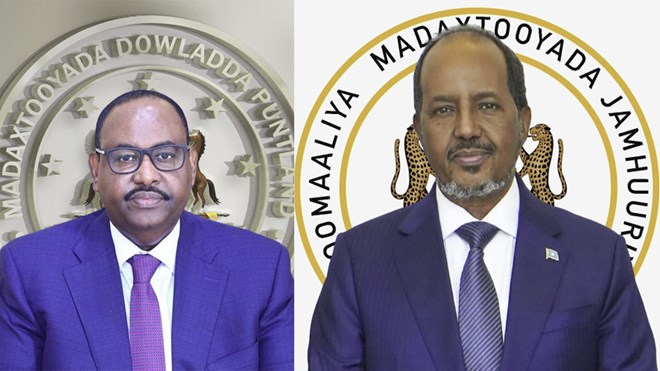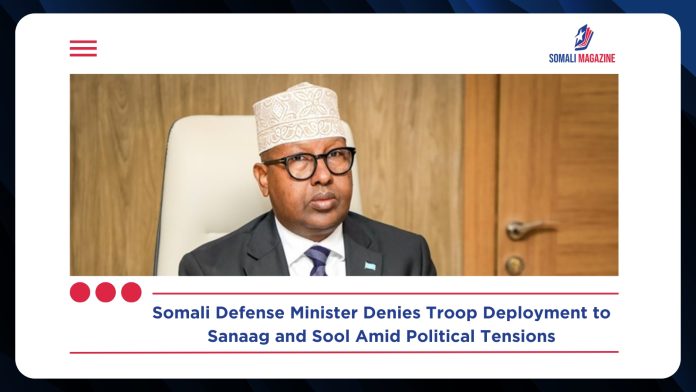Facebook Twitter (X) Instagram Somali Magazine - People's Magazine
Somali defense minister denies federal troop deployment to Sanaag, Sool, dismissing widespread social media claims as baseless and politically motivated. Speaking at a press briefing in Mogadishu on Tuesday, Defense Minister Ahmed Moalim Fiqi firmly rejected allegations that the federal government had dispatched military units, advisers, or equipment to the contested northern regions of Sanaag and Sool.
“There is no operational need for such a deployment, nor has one taken place,” Fiqi stated, adding that the rumors lacked any credible evidence and were being spread by unnamed political actors seeking to stir unrest. His remarks come amid heightened tensions between Puntland and the newly recognized SSC-Khaatumo administration, both of which claim authority over the disputed territories.
Fiqi criticized the contradictory nature of the accusations, pointing out that some critics simultaneously claim the federal government is too weak to secure Mogadishu while also alleging it is strong enough to send battalions hundreds of kilometers north. “You cannot say the federal government fails to control Mogadishu and, in the same breath, insist it is creating a new member state,” he said.
The minister reaffirmed Somalia’s commitment to federalism, describing it as a constitutional obligation shared by all Somali stakeholders. He urged regional leaders to avoid inflammatory rhetoric that could undermine the federal system or exacerbate clan rivalries. “Federalism is not optional—it is enshrined in our provisional constitution and must be implemented with unity and responsibility,” he added.
Rumors of troop movements began circulating last week on Somali-language platforms, sparking concern in Sanaag and Sool, regions that have long been flashpoints in Somalia’s complex political landscape. The territories are claimed by both Somaliland, which declared independence in 1991 but lacks international recognition, and Puntland, an autonomous federal member state.

Security analysts say the timing of the rumors is particularly sensitive, as Somalia prepares to assume full security responsibilities from the African Union Transition Mission (ATMIS) by the end of 2024. The transition to the new AU Support and Stabilization Mission in Somalia (AUSSOM) has already raised questions about the federal government’s capacity to manage internal security without external support.
Local sources contacted by Hiiraan Online and other outlets confirmed that no new Somali National Army presence has been observed in either region, and the Ministry of Defence has not announced any additional security measures following Fiqi’s remarks.
The controversy also reflects broader tensions between Mogadishu and Puntland, which has accused the federal government of undermining its autonomy and supporting SSC-Khaatumo’s expansion. Puntland recently banned unauthorized meetings and vehicles bearing SSC-Khaatumo or Somaliland license plates in Sanaag, further escalating the standoff.
While the federal government continues to advocate for dialogue and peaceful resolution, the political climate remains volatile. Analysts warn that misinformation and political maneuvering could derail Somalia’s fragile federalism and reignite conflict in regions already grappling with insecurity and humanitarian challenges.
As Somalia moves toward its 2026 elections, the need for clear communication, constitutional adherence, and regional cooperation has never been more urgent. For now, the defense minister’s denial seeks to calm tensions—but the underlying disputes over territory, governance, and federal authority remain unresolved.

